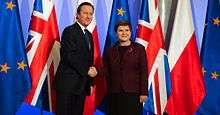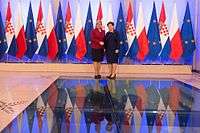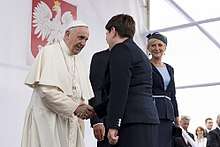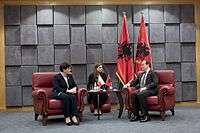Beata Szydło
| Beata Szydło | |
|---|---|
 | |
| Deputy Prime Minister of Poland | |
|
Assumed office 11 December 2017 | |
| Prime Minister | Mateusz Morawiecki |
| Preceded by | Mateusz Morawiecki |
| 16th Prime Minister of Poland | |
|
In office 16 November 2015 – 11 December 2017 | |
| President | Andrzej Duda |
| Deputy |
Piotr Gliński Mateusz Morawiecki Jarosław Gowin |
| Preceded by | Ewa Kopacz |
| Succeeded by | Mateusz Morawiecki |
| Personal details | |
| Born |
Beata Maria Kusińska 15 April 1963 Oświęcim, Poland |
| Political party | Law and Justice |
| Spouse(s) | Edward Szydło |
| Children | 2 |
| Alma mater | Jagiellonian University |
| Website | Official website |
Beata Maria Szydło ([bɛˈata ˈmarja ˈʂɨdwɔ] (![]()
After the 2015 parliamentary election, as prime minister, she formed a cabinet, which took office on 16 November 2015. Before her appointment as prime minister, she had successfully led the presidential campaign of Andrzej Duda, the 2015 presidential nominee of the Law and Justice party. On 7 December 2017 she resigned as prime minister, along with all the members of her cabinet. The next day her resignation was accepted by President Duda, who at the same time designated Mateusz Morawiecki to be Poland's new prime minister.[2]
Szydło was the third woman to be prime minister, after Hanna Suchocka and Ewa Kopacz, and the first woman to succeed another woman (Kopacz) to that office. In 2017 she was 31st in Forbes magazine's ranking of the world's 100 most powerful women[3] and 10th among the most influential women political leaders.[4]
Early years and education
Szydło was born in Oświęcim and raised near Brzeszcze, where her father was a miner.[5] She graduated from Jagiellonian University in Kraków in 1989[6] where she completed studies at the Department of Ethnography.[7] In the years 1989 – 1995, she was a PhD student at the Philosophy and History Faculty of that university. In 1997, she completed post-graduate studies for managers of culture at Warsaw School of Economics, whereas in 2001 at Kraków University of Economics - management of local government in the European Union.
Political career
Szydło was elected Mayor of Gmina Brzeszcze at the age of 35, holding this position for seven years.[7] During her campaign, along with locals she helped renovate the school in a small town of Pcim, which lost its roof in a storm.[7] In 2004, she participated in International Visitor Leadership Program.[8] In September 2005, she was elected to the Sejm, the lower house of the Parliament of the Republic of Poland receiving 14,499 votes in 12 Chrzanów district, as a candidate of the conservative Law and Justice party.[6] She was elected member of the 5th, 6th, 7th and 8th Parliament of the Republic of Poland. She was appointed vice-chairman of the Law and Justice Party On 24 July 2010, and later in September 2014, she succeeded Stanisław Kostrzewski as the treasurer of the Law and Justice party.
Following her successful leadership of Andrzej Duda's presidential campaign, at the Law and Justice party convention on 20 June 2015 Szydło was named as Law and Justice's candidate for Prime Minister in the Polish parliamentary election.[9] She was widely seen as being more moderate than Law and Justice chairman Jarosław Kaczyński.[10]
At the October 2015 election, Law and Justice won a decisive victory, becoming the first Polish party to win an outright majority since the end of Communism. Szydło was sworn in as prime minister on 16 November 2015.[11][12]
Prime Minister (2015–2017)
.jpg)
.jpg)
On 18 October 2015 she made her keynote address (pl), further receiving 236 votes in favour of her government. One of her first decisions was to remove the European Union flag from press conferences at the Chancellery of the Prime Minister and to replace the clock in the meeting hall of the Council of Ministers with a Cross.[13][14] In meetings with voters, she promised to reduce the retirement age and raise the minimum wage.[15] She declared introducing the 500+ programme will be her priority as Prime Minister. The programme was introduced on 1 April 2016, supplying families with 500PLN for every child, starting from the second child. It is intended to serve as a demographic stimulus, and enhance population growth.
One of the biggest controversies during her administration, the Polish Constitutional Court crisis, 2015 was officially criticized by the European Parliament, which, on 13 April 2016, passed a resolution declaring that the Parliament "is seriously concerned that the effective paralysis of the Constitutional Tribunal in Poland endangers democracy, human rights and the rule of law".[16][17]
Beata Szydło's government was strongly opposed to the UK's effort to stop EU immigrants claiming in-work benefits for four years if they moved to Britain.[18] Increasing the support for Brexit, Beata Szydło did offer support in return for a permanent base of NATO troops on Polish territory, in breach of a 1997 agreement with Russia.[19]
On 7 December 2017, she resigned from office along with all members of her cabinet. The next day her resignation was accepted by the President Andrzej Duda, who at the same time designated Mateusz Morawiecki as new Prime Minister.[2][20]
Security incidents
On 21 November 2016, Szydlo's vehicle was involved in a 5 vehicle crash in Israel which included a police car and ambulance. She was in Israel for government to government talks and to meet with Prime Minister Benjamin Netanyahu.[21] Just a few months later, on 10 February 2017, Szydło and 2 security officials were injured in a car crash in her hometown, Oświęcim. Her Audi limousine swerved and hit a tree to avoid a small Fiat whose driver was later charged with involuntary violation of traffic safety. She suffered bruises and was hospitalised in Warsaw.[22][23]
Personal life
Szydło is married to Edward Szydło. The couple has two sons:[7] Tymoteusz (born 1992), a Catholic priest, and Błażej (1994).[5][6][24] She is a devout Catholic and declares her adherence to conservative Christian values.[25]
State visits gallery
.jpg)
 Polish Prime Minister Beata Szydło with David Cameron (2015)
Polish Prime Minister Beata Szydło with David Cameron (2015) Polish Prime Minister Beata Szydło with Kolinda Grabar-Kitarović (2016)
Polish Prime Minister Beata Szydło with Kolinda Grabar-Kitarović (2016) Polish Prime Minister Beata Szydło with Erna Solberg (2016)
Polish Prime Minister Beata Szydło with Erna Solberg (2016) Polish Prime Minister Beata Szydło with Pope Francis (2016)
Polish Prime Minister Beata Szydło with Pope Francis (2016) Polish Prime Minister Beata Szydło with Juan Carlos Varela (2016)
Polish Prime Minister Beata Szydło with Juan Carlos Varela (2016).jpg)
 Polish Prime Minister Beata Szydło with Bujar Nishani (2016)
Polish Prime Minister Beata Szydło with Bujar Nishani (2016) Polish Prime Minister Beata Szydło with Angela Merkel (2017)
Polish Prime Minister Beata Szydło with Angela Merkel (2017).jpg) Polish Prime Minister Beata Szydło with Jüri Ratas (2017)
Polish Prime Minister Beata Szydło with Jüri Ratas (2017).jpg) Polish Prime Minister Beata Szydło with Xavier Bettel (2017)
Polish Prime Minister Beata Szydło with Xavier Bettel (2017)
See also
References
- ↑ "Poland country profile". BBC News. 2017-12-13. Retrieved 2018-01-28.
- 1 2 "Poland's president designates finance minister Morawiecki as new PM". Retrieved 2017-12-09.
- ↑ "The World's 100 Most Powerful Women". Retrieved 2017-11-03.
- ↑ "Women Who Rule the World: The 25 Most Powerful Female Political Leaders 2017". Retrieved 2017-11-03.
- 1 2 Adam Easton (26 October 2015). "Beata Szydlo: Polish miner's daughter set to be PM". BBC Online. Retrieved 29 October 2015.
- 1 2 3 Polish Press Agency (16 November 2015). "Beata Szydło – premier" (in Polish).
- 1 2 3 4 Puhl, Jan (2015-10-20). "Polish Elections: Law and Justice Party Regains Credibility by Dialing Down Rhetoric". Spiegel Online. Retrieved 2018-01-28.
- ↑ "Beata Szydło "About me" homepage". Retrieved 23 September 2015.
- ↑ "PiS picks Szydło as candidate for PM". Warsaw Business Journal. 22 June 2015. Retrieved 3 July 2015.
- ↑ "Poland elections: Conservatives secure decisive win". 25 October 2015. Retrieved 25 October 2015.
- ↑ Prezydent Rzeczypospolitej Polskiej (16 November 2015). "Postanowienie Prezydenta Rzeczypospolitej Polskiej z dnia 16 listopada 2015 r. o powołaniu Prezesa Rady Ministrów" (in Polish). Kancelaria Sejmu RP: Internetowy System Aktów Prawnych.
- ↑ "Beata Szydło sworn in as new Prime Minister of Poland". Polskie Radio dla Zagranicy. Retrieved 2018-01-28.
- ↑ "Na konferencjach rządu nie będzie flag Unii Europejskiej. Beata Szydło wyjaśnia zmianę" (in Polish). Wirtualna Polska. PAP. 24 November 2015. Retrieved 21 April 2016.
- ↑ "Krzyż zamiast zegara - nowe porządki w sali posiedzeń Rady Ministrów". TR (in Polish). Onet.pl. 9 December 2015. Archived from the original on 5 May 2016. Retrieved 21 April 2016.
- ↑ Smith, Alex Duval (2015-10-26). "'The name is Szydło, Beata Szydło': Poland's PM in waiting emerges from obscurity". the Guardian. Retrieved 2018-01-28.
- ↑ "Poland's 'paralysis' of top court is 'danger to democracy' – European Parliament". Retrieved 2016-08-22.
- ↑ "European Parliament scolds Poland". 2016-04-13. Retrieved 2016-08-22.
- ↑ "Poland hints that the UK will have to soften its hard line on immigration during Brexit talks". Business Insider. Retrieved 2018-01-28.
- ↑ "Prime Minister Beata Szydło: NATO Summit was Poland's huge success". www.msz.gov.pl. Retrieved 2018-01-28.
- ↑ Grzymala-Busse, Anna (2017-12-12). "Analysis | Poland's right-wing government has a new prime minister. Here are the 5 things you need to know". Washington Post. ISSN 0190-8286. Retrieved 2018-01-28.
- ↑ "Polish PM involved in Jerusalem pile-up". Times of Israel. 21 November 2016.
- ↑ "Polish prime minister hurt in car crash but prognosis good". AP. 10 February 2017.
- ↑ "Man charged in car crash that injured Polish prime minister". AP. 14 February 2017.
- ↑ "Poland's PM attends first Mass celebrated by her son". ABC. 28 May 2017. Retrieved 29 May 2017.
- ↑ "Beata Szydło modli się o zwycięstwo! ZDJECIA tylko na SE.pl" (in Polish). Super Express. 21 June 2015. Retrieved 21 April 2016.
External links
| Wikimedia Commons has media related to Beata Szydło. |
- Official website (in Polish)
- Beata Szydło's entry on the Sejm website (in Polish)
| Political offices | ||
|---|---|---|
| Preceded by Ewa Kopacz |
Prime Minister of Poland 2015–2017 |
Succeeded by Mateusz Morawiecki |